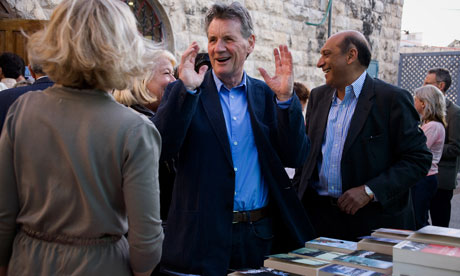
On the edge of the busy forecourt of Jerusalem's world-famous American Colony hotel, Munther Fahmi is in his usual spot; sitting in the bookshop that has become a haven of tolerance for scholars in a bitterly divided city. For 13 years, Fahmi has lined his shelves with works of history and literature, written by Arabs, Jews and scholars from around the world. Over that time, he has created what has been described as "the only decent English-language bookshop in the country".
"It's the most enjoyable thing I have ever done in my life. It has been such a part of the life of Jerusalem," he told the Observer. "I really did not fully appreciate how much until it was under threat."
The threat is real and imminent. Fahmi is due to find out in the next few days whether the Israeli ministry of the interior will order him to leave the city where he was born because, like many Israelis and Palestinians, he spent an extended period of his life abroad and his residency lapsed. Since returning from America in the 1990s, the 56-year-old has been living in Jerusalem on a succession of temporary tourist visas, which 18 months ago the authorities warned that they would not renew. His predicament has outraged two of Israel's most celebrated novelists, Amos Oz and David Grossman, who have signed a petition asking the authorities to allow Fahmi to stay. From the British Isles, Ian McEwan, Roddy Doyle and John Banville have also offered their support.
Simon Sebag Montefiore, the author of Jerusalem: The Biography, came across Fahmi and his bookshop while working in Jerusalem. "For me a bookshop is a sacred place, a temple which should be above politics," he said. "Some bookshops have an agenda; Munther's does not. He simply celebrates books about the Middle East, Israeli writers, Palestinian writers. He's exactly the kind of person a country needs to be staying and running this kind of business."
Grossman said that Fahmi was one of many Palestinians whose residence in Jerusalem was threatened by Israeli laws. "He was born in Jerusalem, he has lived most of his life in Jerusalem and his family lives in Jerusalem. What is being done to him is an outrage. It's part of an attempt to embitter the lives of Palestinians so that they leave."
Fahmi was born in the Old City of Jerusalem in 1954, when it was under Jordanian military control. After the six-day war in 1967, Israel annexed east Jerusalem. Like most Arab residents, Fahmi's family chose not to acquire Israeli citizenship. Instead they were granted permanent residency.
As Israeli-Palestinian tensions grew, Fahmi decided, at the age of 21, to go to business college in New York and later set up his own insurance company in St Louis, Missouri. In order to maintain his "residency" in Jerusalem, Fahmi returned regularly but, in 1983, pressure of work kept him in the US and his permit expired. As he possessed a US passport, it didn't seem to matter, but 10 years later times had changed.
In 1993 the Palestinian leader, Yasser Arafat, and the Israeli prime minister, Yitzak Rabin, shook hands in front of the White House. Palestinians and Israelis believed that decades of strife was at an end. Munther recalled: "I was so optimistic, like so many people. We thought that peace was finally here. I didn't know what I would do, I thought I would just go to Jerusalem and figure it out."
Fahmi noticed how hard it was to get English-language books. Many Israeli authors who wrote in English could not sell their books in their own country. "I bought a selection of books and hosted a book fair in Tel Aviv. When that succeeded I took it to the American Colony hotel and fell in love with the place," he said. He opened the shop there in 1998.
The American Colony is one of the few 19th-century landmarks of Jerusalem. The building was bought from a local nobleman by American pilgrims who eventually turned it into a hotel. For years, Fahmi had travelled to Jerusalem on a three-month tourist visa, leaving before it expired. "I needed to travel for work regularly so it was easy to manage," he said.
The authorities appeared content to let the arrangement continue, but have recently refused to renew his visa. Last year Fahmi lost a bid to win back his residency rights. An appeal was rejected, but he was given 30 days to ask the interior ministry to stay in Jerusalem on humanitarian grounds. The ministry is now considering his request.
A spokesman said: "We do not just decide to cancel someone's residency. They do it. If he makes an application to the ministry for residency on humanitarian grounds, we will consider it."
Avi Shlaim, professor of international relations at Oxford University, described the treatment of Jerusalem's most famous bookseller as symptomatic of the "chauvinistic and intolerant" behaviour of Israel's current government under Binyamin Netanyahu: "Things have come to a pretty pass when a Palestinian, born in Palestine, who has a business, who has done no harm to anyone, is hounded out of his bookshop because he does not toe the party line."
Now Fahmi must wait. "I have made no plans. I can't envisage leaving. I have a very sick mother who depends on me. I'm 56; I can't start my life all over again. I'm just hoping that this government will look favourably on me," he said.

